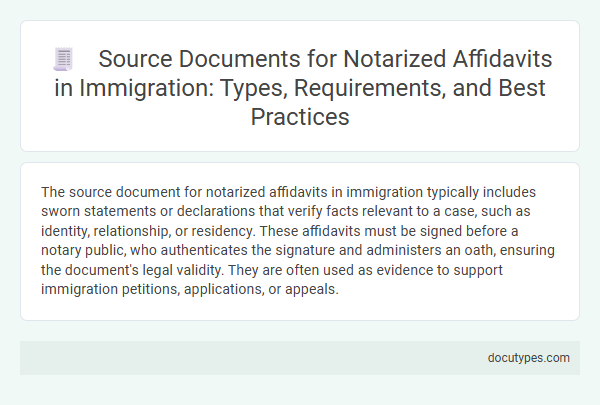The source document for notarized affidavits in immigration typically includes sworn statements or declarations that verify facts relevant to a case, such as identity, relationship, or residency. These affidavits must be signed before a notary public, who authenticates the signature and administers an oath, ensuring the document's legal validity. They are often used as evidence to support immigration petitions, applications, or appeals.
Introduction to Notarized Affidavits in Immigration
What is the source document for notarized affidavits in immigration? Notarized affidavits in immigration derive their authority from official statements sworn before a licensed notary public. This legal endorsement ensures that your affidavit is recognized as valid evidence in immigration proceedings.
Importance of Source Documents in Immigration Processes
Source documents for notarized affidavits in immigration serve as primary evidence validating the claims made within the affidavit. These documents include birth certificates, marriage certificates, or other official records that establish identity, relationship, or eligibility.
Immigration authorities rely heavily on source documents to verify the authenticity of affidavits and prevent fraud. Accurate source documentation ensures the integrity of the immigration process and supports favorable decision-making.
Common Types of Source Documents for Affidavits
Source documents for notarized affidavits in immigration serve as primary evidence supporting the statements made in the affidavit. These documents validate the authenticity of personal information, relationships, or events described in the affidavit.
- Birth Certificates - Official records issued by government authorities confirming an individual's date and place of birth.
- Marriage Certificates - Legal documents proving the formal union between two individuals, often required to establish familial relationships.
- Identification Cards or Passports - Government-issued IDs verifying the identity and nationality of the affidavit signer or related persons.
Legal Requirements for Source Documents
The source document for notarized affidavits in immigration cases must meet strict legal requirements to ensure authenticity and validity. These documents serve as foundational evidence to support claims during the immigration process.
- Original Documents Required - Source documents must be original or certified copies issued by official entities to be accepted for notarization.
- Clear Identification - Documents must clearly identify the parties involved and the relevant facts to establish credibility.
- Compliance with Legal Standards - The source document must comply with immigration laws and guidelines to be considered valid during affidavit submission.
Your notarized affidavit will not be accepted without a proper source document that fulfills these requirements.
Document Authentication and Verification Procedures
The source document for notarized affidavits in immigration is typically an original or certified copy of identity or supporting documents referenced within the affidavit. Immigration authorities require strict document authentication and verification procedures to ensure the affidavit's legitimacy. These processes often involve cross-checking notarization seals, verifying the notary public's credentials, and confirming the authenticity of the underlying source documents.
Best Practices for Preparing Notarized Affidavits
The source document for notarized affidavits in immigration cases is typically a sworn written statement that provides truthful information relevant to the applicant's case. This affidavit must be signed in the presence of a certified notary public, who verifies the identity of the signer and administers an oath.
Best practices for preparing notarized affidavits include ensuring the document contains clear, factual details and is free from any alterations or errors. You should present valid identification to the notary and clearly state all facts related to your immigration matter to enhance the affidavit's credibility and legal acceptance.
Addressing Common Issues with Source Documents
The source document for notarized affidavits in immigration cases typically includes official identification or legal documents that verify the affiant's identity and claims. Proper source documents ensure the authenticity and credibility of the affidavit within immigration proceedings.
- Proof of Identity - Source documents such as passports, national ID cards, or driver's licenses confirm the affiant's identity for the affidavit.
- Legal Status Documentation - Birth certificates, marriage certificates, or immigration records serve as legal evidence supporting the affidavit's statements.
- Addressing Common Issues - Ensuring source documents are original, certified copies or properly notarized prevents delays and rejection of affidavits.
Tips for Submitting Supporting Documents to Immigration Authorities
The source document for notarized affidavits in immigration is typically an original government-issued identification or official record related to the case. Proper documentation ensures the affidavit's authenticity and supports the credibility of the statements made.
Submitting supporting documents to immigration authorities requires careful organization and clarity. Include original documents when possible, or certified copies if originals cannot be provided. Ensure all affidavits are notarized by a licensed notary public to meet legal standards and avoid processing delays.
Consequences of Inadequate or Fraudulent Documentation
The source document for notarized affidavits in immigration is typically an original, verifiable record such as a birth certificate, marriage certificate, or government-issued identification. Inadequate or fraudulent documentation can lead to severe legal consequences, including denial of immigration benefits and potential deportation. Your case's credibility heavily depends on the authenticity and accuracy of these source documents.
What Is the Source Document for Notarized Affidavits in Immigration? Infographic

